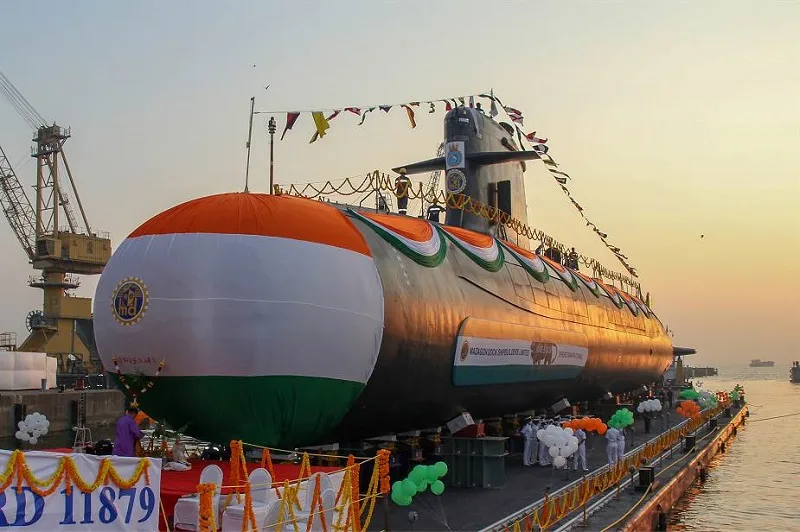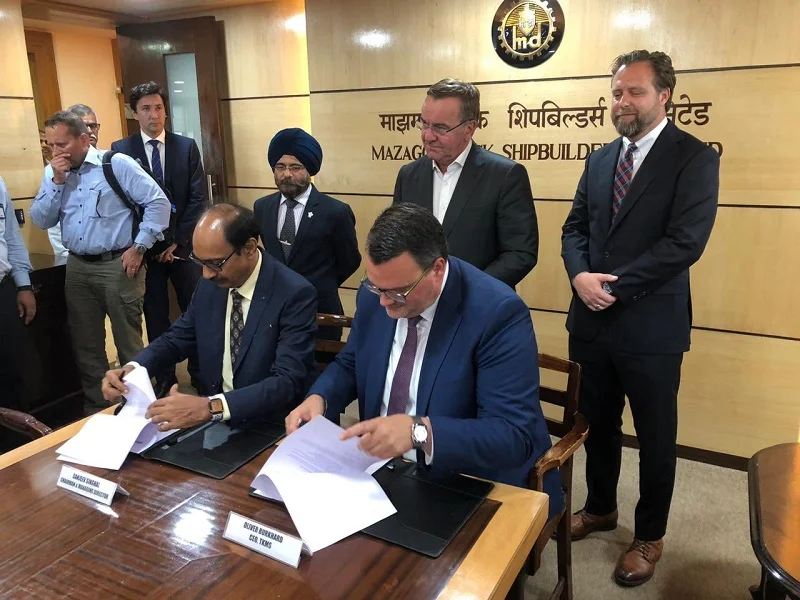

While the German company would contribute to the engineering and design of the submarines, Mazagon Dock Shipbuilders Limited will be responsible for constructing and delivering them (File image courtesy: Indian Navy)
With the defence ties becoming a key pillar of the India-Germany Strategic Partnership, Thyssenkrupp Marine Systems – a German world market leader in non-nuclear submarines – has signed a Memorandum of Understanding (MoU) with Mazagon Dock Shipbuilders Limited on the intended construction of conventional, Air-Independent Propulsion (AIP) submarines.
The MoU signing ceremony, which took place in Mumbai on Wednesday in the presence of German Defence Minister Boris Pistorius, has laid the foundations for the German company’s future cooperation with India’s premier defence shipyard to compete in the Indian Navy’s tender for the supply of six submarines in a deal believed to be worth six billion Euros.
AIP submarines are highly sophisticated platforms that can travel underwater for long distances. This increases their survivability as non-AIP submarines are most vulnerable when they surface for fueling at fairly regular intervals.


As reported by IndiaNarrative.com, Pistorius discussed “concrete cooperation” in military procurement during his meeting with Defence Minister Rajnath Singh in New Delhi on Tuesday, including Kiel-based TKMS partnering with India’s leading Defence PSU shipyard for joint production of submarines.
“That could be a flagship project,” said Pistorius as he called India a “strategically reliable partner” that Berlin should be treating at par with Australia and Japan when it comes to arms exports.
The parties to the MoU signed on Wednesday intend to cooperate in a joint project in which Thyssenkrupp Marine Systems contributes to the engineering and design of the submarines as well as providing consultancy support.
The MoU also states that Mazagon Dock Shipbuilders Limited would be responsible for constructing and delivering the respective submarines. The construction work would take place in India and is expected to include significant local content.
With the six new submarines, India’s underwater fleet would be fully modernised. The ‘Made in India’ submarines with niche German technology would be complemented by six Kalvari or Scorpene submarines of France, which will eventually be retrofitted with AIP technology developed by the Defence Research and Development Organisation (DRDO). Apart from conventional submarines, India is also building its fleet of nuclear submarines.
The German company’s association with the Indian Navy dates back to the 1980s when it (then HDW in Kiel) supplied two of the four Shishumar-class non-nuclear (HDW Class 209) submarines. The other two Shishumar-class non-nuclear submarines (INS Shishumar) were built at the defence ministry-run MDL in Mumbai. All four vessels were successfully commissioned into the Indian Navy and continue to serve as frontline assets in the Indian Navy’s Mumbai-based submarine fleet.
Having already cooperated closely in completing big projects in India, TKMS affirmed that both parties plan to draw on many years of expertise, knowledge and professional competence in fulfilling the project to everyone’s complete satisfaction.
“We look back on a trusting and decade-long partnership with India. The boats we built in the 1980s are still in service today. We are very proud of that and would be delighted to continue contributing to India’s national security in the future. We are ready when India calls,” Oliver Burkhard, CEO, Thyssenkrupp Marine Systems, said in a statement.
Under its resolve to become a completely self-reliant, combat-ready, credible, cohesive and future-proof force until 2047, Indian Navy is going ahead full steam with its mission to have ‘Made in India’ ships, submarines, aircraft, unmanned vessels and systems.
Defence Minister Singh suggested Tuesday that India and Germany could build a more symbiotic relationship based on shared goals and complementarity of strength, namely skilled workforce and competitive costs from India and high technologies and investment from Germany.
Before wrapping up his India visit on Wednesday, the German Defence Minister visited the Headquarters of the Western Naval Command and also interacted with the sailors aboard the indigenous stealth guided-missile destroyer INS Mormugao.
The navies of both countries will also be holding a joint exercise later this year during the Indo-Pacific deployment of German warships.
Australia's High Commissioner to India, Philip Green OAM, called Yoga one of India's gifts to…
The Bharat Sanchar Nigam Limited (BSNL) has announced the soft launch of BSNL Quantum 5G…
The Indian Embassy in Iran has said that the embassy will make efforts to evacuate…
India's gross direct tax collections for the financial year 2025-26 rose by 4.86 per cent…
Russian President Vladimir Putin has said that Moscow is not seeking Ukraine's unconditional surrender, but…
Extending his greetings on the 11th International Day of Yoga, Lok Sabha speaker Om Birla…